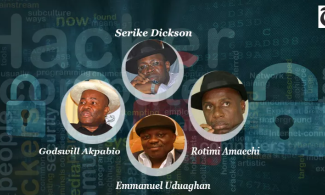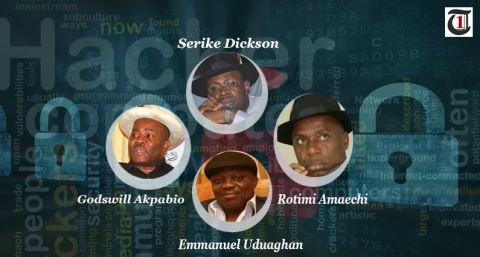
Investigators from the office of the National Security Adviser later found the governors’ claims that they were hacking phones to track kidnappers to be false, suggesting the governors targeted political superiors, associates and peers, while using the SSS to disguise the expedition as approved national security projects.

The governor of Bayelsa state, Seriake Dickson, is not the only politician hacking phones and intercepting communication of political peers and rivals in Nigeria.
Almost all recent governors of the South South region of Nigeria intercepted calls and hacked phones and computers, an illegal practice that gave them backdoor access to many people’s private lives, an ongoing PREMIUM TIMES investigation has revealed.
Our findings show that Rotimi Amaechi, former Rivers state governor; Godswill Akpabio, former Akwa Ibom state governor; and Emmanuel Uduaghan, former Delta state governor illegally acquired technologies that allowed them conduct mass surveillance and hack people’s gadgets, mainly to eavesdrop on their conversations, know who they talked with and what their plans were.
These three formers governors are the latest privacy violators and spymasters weeks after Mr. Dickson was exposed for similar illegal practice. They all exited office as governors in May, following the end of their second term in office.
Most of the hacking carried out by the governors occurred within the last four years, during the last term of their two-term tenures as governors and at times in liaison with compromised federal security authorities.
In fact, those who should know said some officials of the State Security Service, SSS, colluded with the governors as they engaged in massive hacking, helping disguise their acts as federal security projects.
Officials at the office of the National Security Adviser admitted demanding explanations from the hacking governors over their illegal surveillance programmes at different times with each of them giving similar excuses.
“They claimed they were using it to track kidnappers,” officials at the office of the National Security Adviser said. “The governors claimed they were carrying out the operations with the SSS, but our investigations showed they were running it from their offices.”
Investigators from the office of the National Security Adviser later found the governors’ claims that they were hacking phones to track kidnappers to be false, suggesting the governors targeted political superiors, associates and peers, while using the SSS to disguise the expedition as approved national security projects.
Some politicians and businessmen interviewed for this story from the affected states said they knew all along that these governors monitored their communications illegally.
A contractor from Akwa Ibom said Governor Akpabio refused to pay him for the project he executed for the state after he tapped his phone and overheard some critical comments he made about the former governor to some friends.
“He once boasted to me that he knew what I was doing and what I was saying about him,” the contractor said.
Rivers State
The Rivers spying program started in 2008 – in the wake of the Niger Delta amnesty program – as a security contract targeted at helping the police in the state respond faster to crime scenes using a C4i (Command, Control, Communications, Computers, and Intelligence) technology deployed by an Israeli military security firm, MPD Systems.
The project saw the Rivers State government and MPD Systems train at least 1,500 security officials, providing the perfect ‘federal’ cover under which the political spying was carried out.
The spokesperson of the Amaechi regime, Ibim Semenitari, argued that the project could not have been used for spying on politicians.
“Given the well publicized infractions between the Rivers State Government and the GEJ (Goodluck Ebele Jonathan)-led federal Government the state would not have been able to embark on the issues raised without the security agencies clamping down on its officials,” she said.
She also argued that the project was approved by late former president, Umaru Musa yar’Adua, after a presentation attended by Nigeria’s service chiefs at the time and the then head of the SSS, Afakriya Gadzama.
“Equipment were imported with the approval of the NSA,” and “The outfit was manned by security officials drawn from the Police and SSS who were responsible to their state commands,” Ms. Semenitari argued.
The office of the National Security Adviser denied issuing the End User Certificate for C4i. Also, the command centre was installed and operated from the Government house, rather than the SSS or Police department.
Mr. Amaechi’s last term as Rivers state governor was very turbulent. He fell out with his close allies, including former first lady, Patience Jonathan, and the current governor, Nyesom Wike. His deputy governor jumped ship few days to the elections.
The state recorded an unprecedented level of political violence in the run-up to the general elections. Mr. Amaechi’s political party, the All Progressives Congress lost that election in the state. A commission of inquiry Mr. Amaechi empanelled to probe the election violence recorded at least 30 deaths of the former governor’s party members. The opposing Peoples Democratic Party boycotted the inquiry.
Akwa Ibom state
Even though Mr. Akpabio and his Rivers counterpart disagreed on many fronts, their appetite for surreptitiously collecting private data from their political associates and rivals appear to tally. Both former governors started their spying facilities on similar premise – to fight kidnapping and other related crimes.
“We knew that he (Godswill Akpabio) acquired a device to monitor people’s telephone calls but there was absolutely nothing we could do,” Umana Okon who was secretary to the state government when the device was installed said. “The device was acquired at the time kidnapping was quite high in the state. But after kidnapping abated, it was used to monitor telephone calls of private citizens and government officials.”
The period when Mr. Akpabio used the phone hacking tools in Akwa Ibom also coincided with a period that was fraught with political assassinations, kidnapping and intimidation.
The National Security Adviser, once in 2012, declined to issue Mr. Akpabio an End User Certificate to buy Hacking Team’s cyber warfare tools.
The Akpabio regime in Akwa Ibom denied running the hacking facility.
Aniekan Umana, the state’s commissioner of information – he was also the information commissioner under Akpabio – said Mr. Akpabio never ran any private security facility, insisting that everything security was run by the SSS and police.
Officials of that government who spoke to PREMIUM TIMES in confidence however confirmed the existence of the spying facility. Like Rivers’, Mr. Akpabio’s spying facility was also installed and run from the governor’s office rather than the SSS or police department.
The state government also denied the claims.
“The governor (Mr. Akpabio) has no need to hack anyone’s phone,” Aniekan Umana said. He claimed that when the state sought the Hacking Team’s tools, it was to help the security agencies.
When the spying became very obvious, many politicians who felt their privacy had been invaded complained to the National Security Adviser but nothing was done.
With a new government installed since May 29, the opposition in Akwa Ibom are now calling for a full-scale investigation of the surveillance programmes and its privacy breaches.
“If the law was breached in any way, those guilty will be made to face justice. That is the minimum we expect from the Federal Government,” Mr. Okon, now an opposition leader, demanded.
Delta state
Delta state was not as violent as both Rivers and Akwa Ibom state during the last elections. But Emmanuel Uduaghan, the state’s former governor who operated the spying tools – also from his office building – cited kidnapping as the reason for purchasing the tool.
Mr. Uduaghan could not be reached for his comments. Text messages and telephone calls to his spokespersons were neither answered nor returned.
Political Goons, Cyber Bullies
The Rivers state C4i, Ms. Semenitari claims, was handed over to the new government, suggesting it is probably still in use.
The Akwa Ibom facility is still in use in the governor’s office, our sources said.
The current state of the Delta state spying facility is unclear.
The office of the National Security Adviser claims the hacking governors repeatedly ignored warnings to discontinue their “illegal” projects, in apparent abuse of their political influence.
Mr. Amaechi was a strong member of the then ruling Peoples Democratic Party and Chairman of the Nigeria Governors’ Forum at the time. He later fell out with former President Goodluck Jonathan and became the leader of President Muhammadu Buhari’s campaign team. He is currently a close ally of Mr. Buhari.
Messrs. Akpabio and Uduaghan were strong allies of former President Jonathan. Mr. Akpabio later became chairman of the PDP Governor’s Forum. He is now a serving senator and Minority leader of the Senate.
Bayelsa Hacking Team
At the time the NSA was probing these three governors, the hacking expedition of the Bayelsa state governor, Seriake Dickson, was largely unknown.
Until it was exposed by PREMIUM TIMES, Mr. Dickson’s hacking activities were stealth and done without permission by the office of the National Security Adviser.
It was only revealed after Hacking Team, the Italian cyber weaponry firm, which provided Mr. Dickson with attack tools was itself hacked early July and internal company documents leaked to the public.
The documents indicate governor’s hacking activities began in 2012 and lasted through 2013, according to Hacking Team’s leaked internal company documents.
In Nigeria, only federal security agencies are allowed to acquire cyber attack and defence tools. And when they did, it has to be with the permission of the National Security Adviser who provides End User Certificates. The right to either intercept communications or act to suspend rights in the face of national security rests with the Federal Government.
None of the hacking governors got either permission or End User Certificates from the Office of the National Security Adviser before embarking on their privacy-breaching surveillance.
In fact, the former Akwa Ibom state governor, now a senator, once failed to secure an End User Certificate from the NSA to buy Hacking Team’s Galileo in 2013.
Cyber security analysts say data acquired by the hacking governors may have been used – and could be used in future – for cyber bullying, intimidation and blackmail.
These illegal hacking activities of politicians spotlights the vulnerability of the private lives of many Nigerians. The Hacking Team’s hack revelations and this, from the office of the National Security Adviser, shows anyone – individuals and organizations – with enough financial and political clout can acquire and deploy hitech hacking tools and illegally collect private data from targeted Nigerians.
“Unfortunately, the law that should protect the right to citizen privacy, and allow them seek redress if illegally hacked, doesn’t exist in Nigeria,” Gbenga Sesan, Executive Director, Paradigm Initiative Nigeria said. “That’s one of the reasons why all the biometric information being obtained by banks (BVN), NIMC (NIN), etc, are unsafe and should be halted until data protection is guaranteed in Nigeria.”
If the former NSA, Sambo Dasuki, who probed these former governors had opted to prosecute them, he would have been held back by the lack of clear laws against the former governors. Nigeria’s CyberCrime law was only enacted in 2015.
A section of the law which could be deployed to punish the hacking governors prescribes a prison term of not more than two years, or a fine of N5 million or both.
“Unauthorised surveillance of individuals is ethically wrong even if our laws are fuzzy about our rights to privacy from digital intrusion,” Femi Longe, co-founder of Co-Creation Hub, argued. “Heaven knows how they have used the information obtained illegally to pervert justice and unduly influence individuals within and outside the state.”